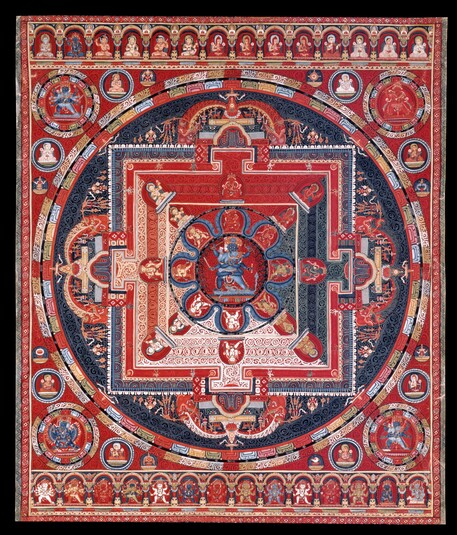
Item: Mandala of Yamari, Krishna (Buddhist Deity) - (6 Faces)
| Origin Location | Nepal |
|---|---|
| Date Range | 1500 - 1599 |
| Lineages | Sakya, Ngor (Sakya) and Buddhist |
| Material | Ground Mineral Pigment on Cotton |
| Collection | Rubin Museum of Art |
Classification: Deity
Appearance: Wrathful
Gender: Male
Krishna Yamari with Vajra Vetali (Tibetan: shin je she nag). Although the painting was likely commissioned and created at Ngor Ewam Monastery in Tsang Tibet, it is undoubtedly created by a Newar artist from the Kathmandu Valley following traditional Newar style of painting, early 1500s.

The following translated description of Yamari is from an the edited version of the Bari Gyatsa by Ngorchen Konchog Lhundrub and describes the male deity only. There are numerous forms of Krishna Yamari although most forms are found either in the Kriya or anuttaryoga Tantras. There are also numerous Terma (Revealed Treasure) forms of the deity belonging to the Nyingma and various Kagyu Traditions of Tibetan Buddhism:
"Krishna Yamari (Tib.: shin je she nag po. English: the Black Killer of Death).
"Yamari has a body black in colour, six faces and six hands. The main face and one above it are black. The right face and one above it are white. The left face and one above it are red. The first two hands hold a vajra and bell crossed at the heart. The middle two hold a skullcup and lasso. The last two hold a sword and staff. Standing with the front two legs in the vajrasana [posture], the middle two have the right bent and the left straight [and] the last two have the left bent and the right straight. The hair, eyebrows and beard are orange and flowing upwards, with a crown of five dry skulls and a necklace of fifty fresh [skulls]. Adorned with snake and jewel ornaments. Having a tiger skin as a lower garment." (Konchog Lhundrub, 1497-1557).
See an ink drawn image of the same mandala #58189.
The Three Yamari Lineages, the Three Mahamandalas, Abhisheka, Sadhana, together with the Branches: Vajradhara, Jnana Dakini, Acharya Lalitavajra, Amoghavajra, Yeshe Jungne Bepa, Padmavajra, Dipamkara Rakshita, Lama Rwa Dorje Drag, Rwa Lotsawa Chorab, Rwa Yeshe Sengge, Rwa Bum Seng, Lama Lokkyapa Wangchug Dragpa, Lama Ngong, Lama Chokyi Gyalpo (Chogyal Pagpa 1235-1280).
Jeff Watt, 6-2006
Front of Painting
English Translation of Inscription: (No inscriptions on the front of the painting).
Collection of Rubin Museum of Art (RMA): Main Page
Collection of Rubin Museum: Mandala Masterworks
Nepal: Masterworks (Painting)
Collection of Rubin Museum: Mandala Masterworks (Curator's Selection)
Buddhist Deity: Yamari, Krishna
Collection of Rubin Museum of Art: Mandala
Collection of RMA: Best of Collection 2
Collection of Jourdan-Barry
Buddhist Deity: Yamari, Krishna (Mandalas)
Collection of RMA: Ngor Style Paintings
Buddhist Deity: Manjushri (Highest Yoga Tantra)
Mandala: Sakya Masterworks
Region: Nepal Main Page
Subject: Ngor Masterworks
Buddhist Deity: Yamari, Krishna (Masterworks)
Buddhist Deity: Yamari Main Page
Mandala: Masterworks Page




